Start earning today: play to earn rewards and capitalize on your gaming time
Start earning today: play to earn rewards and capitalize on your gaming time
Blog Article
Exactly How Play-to-Earn Rewards Are Changing the Gaming Experience
The introduction of Play-to-Earn incentives notes a substantial development in the pc gaming landscape, shifting the emphasis from simple entertainment to real financial participation. This improvement welcomes players to invest not just their time yet also their economic sources, fostering a feeling of ownership and deeper engagement within video game ecosystems. As diverse demographics accept these possibilities, brand-new areas emerge, blurring the lines between leisure and investment. This shift elevates essential concerns about sustainability and the future of pc gaming. What implications could this have for the market and its gamers?

Evolution of Gaming Designs
The landscape of video gaming has undergone a significant change over the decades, evolving from standard pay-to-play designs to much more cutting-edge structures that focus on customer interaction and money making. At first, video games were largely marketed as standalone items, requiring in advance settlements for gain access to. This version, while effective in creating earnings, often minimal gamer communication and area structure.
In recent times, the rise of blockchain modern technology has presented play-to-earn systems that fundamentally alter pc gaming characteristics. These versions not only provide a system for gamers to earn incentives however likewise democratize the gaming economic situation, allowing customers to own in-game properties. This development mirrors a wider trend towards community-driven experiences, where developers and gamers collaborate in shaping the pc gaming landscape, eventually redefining just how worth is perceived in the pc gaming market.
Advantages of Play-to-Earn Equipments
Unlocking brand-new opportunities for gamer engagement, play-to-earn systems supply a variety of advantages that basically enhance the gaming experience. These systems equip gamers by providing tangible incentives for their time and initiative, cultivating a sense of possession and financial investment in the video game. This innate motivation drives players to involve even more deeply, exploring game technicians and areas that they may or else overlook.
Additionally, play-to-earn versions equalize gaming by leveling the having fun area. Gamers from numerous backgrounds can maximize their abilities and imagination, making it possible for new entrants to experience financial benefits that were generally reserved for developers and publishers. This change urges a much more varied gamer base, improving the gaming community with diverse perspectives and experiences.
Additionally, play-to-earn systems promote community building, as players team up and complete within decentralized atmospheres. This interaction cultivates social links that boost satisfaction and retention, as players really feel a sense of belonging.
Last but not least, these systems can lead to enhanced long life for video games, as consistent gamer engagement commonly equates right into continual rate of interest and financial investment in future versions or expansions, ensuring a lively video gaming landscape.
Financial Influence on Players
Play-to-earn systems not only improve player involvement yet also have significant financial effects for individuals entailed. These systems permit gamers to monetize their time and skills, transforming gaming from a pastime right into a practical income resource. As players earn copyright or in-game properties that can be traded or marketed in real-world markets, they acquire financial incentives that can substantially affect their personal economic climates.
The financial model promotes a brand-new our website wave of entrepreneurship, as gamers can purchase different pc gaming ecological communities or establish techniques to enhance their earnings. This potential for income generation draws in a diverse demographic, including those in regions with minimal task possibilities - play to earn rewards. Consequently, numerous gamers are currently seeing gaming not just as amusement yet as a path to financial empowerment.
Nonetheless, it is necessary to identify the volatility connected with cryptocurrencies and the potential for market fluctuations to affect earnings. Players need to browse these risks while balancing their gaming and economic tasks. Overall, the economic effect on players is profound, improving their connection with video gaming and opening up opportunities for wide range creation in a progressively digital economic situation.
Neighborhood Structure in P2E Gamings

Gamers in P2E environments frequently form guilds or partnerships, producing networks that help with resource sharing, calculated planning, and shared support. These teams often engage in cooperative objectives or competitions, further enhancing their bonds and enhancing the total video gaming experience. Additionally, community-driven occasions, such as tournaments and social celebrations, offer to unify gamers, foster camaraderie, and incentivize involvement.
Moreover, designers actively involve with their areas, integrating responses and recommendations that form game advancement. This joint strategy not only empowers gamers yet additionally ensures that games advance abreast with player interests, improving satisfaction and long-term involvement. Eventually, area building in P2E video games is not simply an attribute; it is a foundational facet that changes the gaming landscape into a much more comprehensive and interactive setting.
Future Patterns in Pc Gaming
The video gaming industry's evolution is positioned to embrace a number of transformative trends that will redefine gamer engagement and experience. Among one of the most significant patterns is the combination of artificial knowledge (AI) to develop even more personalized pc gaming settings. AI can assess gamer behavior and preferences, allowing developers to customize experiences that reverberate deeply with specific users.
Moreover, the advent of online and augmented truth (VR/AR) technologies is set to boost immersion, supplying gamers the ability to interact with digital worlds in unmatched ways. This will certainly not just elevate gameplay but also foster social links, as players can work together and complete in common atmospheres.
In addition, the rise of blockchain technology will proceed to influence the gaming landscape, allowing real ownership of in-game possessions via non-fungible symbols (NFTs) This trend will empower players to trade and monetize a knockout post their video gaming experiences, better blurring the lines in between pc gaming and investment.
Conclusion
To conclude, the development of play-to-earn benefits indicates a pivotal change within the gaming market. By integrating economic incentives right into gameplay, players are progressively engaged, fostering a feeling of possession a knockout post and financial investment in electronic environments. Additionally, the democratization of pc gaming assists in varied engagement, promoting collaboration and neighborhood structure. As these trends continue to progress, the obscured lines between enjoyment and financial investment will likely redefine the future of pc gaming, shaping brand-new experiences for players worldwide.
Report this page